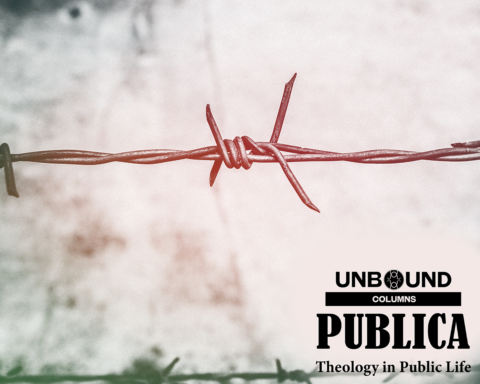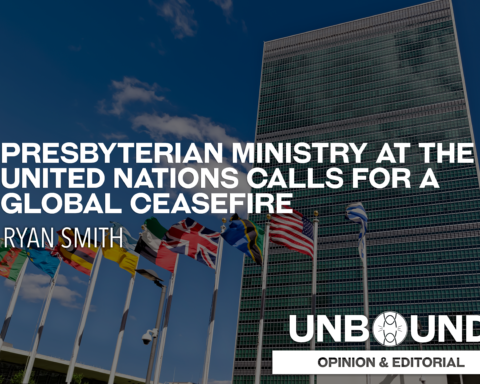The following sermon was preached at Rutgers Presbyterian Church on November, 22, 2015, Christ the King Sunday. Author Rev. Mark Koenig writes, “I rarely post sermons, however this one received enough positive feedback that I make an exception. Note that this is the manuscript that went into the pulpit; the sermon that came out no doubt differed in several ways.” This sermon was originally published on Mark’s personal blog, http://graybeardtrail.com/2015/11/22/the-refugee-jesus/.

Photo Credit: Michael Krenzer
Text: John 18:33-37
Fear. We have to talk about fear this day if we wish to talk about refugees.
Fear always creeps into conversations about refugees and immigrants—a fear of the other—of people from whom we differ.
But this day, we gather after
a bombing in Baghdad
a bombing in Beirut
an attack with guns and bombs on Paris
a bombing in Yola, Nigeria
a bombing in Kano, Nigeria
an attack on a hotel in Bamako, Mali
yet more bombings in Baghdad.
And fear has entered the conversation.
Fear of Daesh and other terrorist groups.
Fear of Muslims even though Muslims have been the targets and victims of many of the attacks.
Fear of refugees, particularly refugees from Syria and Iraq.
___________________________________________
Surrendering to fear in relation to our brothers and sisters who flee for their lives flies in the face of everything I believe as a follower of Jesus.
___________________________________________
Political leaders and candidates and pundits have pandered to the fear and fed the fear.
 Governors have said their states will not accept refugees from Syria. The U.S. House of Representatives has voted to make the vetting process for refugees from Syria and Iraq more difficult, it not impossible. Some leaders have essentially said “No Muslims need apply” or “Christians only.” Both phrases resonate with nativist and racist language from our past.
Governors have said their states will not accept refugees from Syria. The U.S. House of Representatives has voted to make the vetting process for refugees from Syria and Iraq more difficult, it not impossible. Some leaders have essentially said “No Muslims need apply” or “Christians only.” Both phrases resonate with nativist and racist language from our past.
In at least one instance, the internment of Japanese American citizens during World War II has been cited as a model for refusing Syrian refugees rather than the evil act of racism that is was.
And one candidate for President called for a mandatory registry of Muslims in the United States, a call that evokes the horror of the Holocaust. The New York Times reports he may be pulling back from that position somewhat.
We cannot talk about refugees on this day without talking about fear.
Some pastors may preach that we should be afraid. We should hunker and hide in fear. And we should allow fear to guide us in our behavior and relationships with refugees. I will not do that.
Surrendering to fear in relation to our brothers and sisters who flee for their lives flies in the face of everything I believe as a follower of Jesus. It goes against everything I believe as a citizen of this country and a resident of our great city where in the harbor stands a statue with a poem:
Give me your tired, your poor,
Your huddled masses yearning to breathe free,
The wretched refuse of your teeming shore.
Send these, the homeless, tempest-tost to me,
I lift my lamp beside the golden door!”
And it goes against the policy statements and congregational actions of the Presbyterian Church (U.S.A.). Presbyterians have supported refugee resettlement since the refugee crisis created by World War II. The 160th General Assembly (1948) of the Presbyterian Church in the United States of America stated, “The United States should pass legislation to bring in at least four hundred thousand displaced persons during the next four years.” (Minutes, PCUSA, 1948, Part I, p. 204). Presbyterian congregations have helped resettle thousands of our brothers and sisters through the years.
___________________________________________
Jesus teaches us that the way we individually and collectively treat the least of our sisters and brothers is the way we treat him. In the world’s refugees we encounter the Refugee Jesus.
___________________________________________
Some pastors may preach today that we have nothing to fear. After all, fear not is what Jesus told his disciples on several occasions. Sermons will proclaim that that God is completely in control, life is working out according to God’s plan, God will protect us, and we have no reason for fear. I will not do that.
 The world is a broken and fearful place. I know that and you know that. I fear for my African American friends, Native American friends, Hispanic, Latino/Latina friends, Asian American friends in their encounters with law enforcement and in their daily lives within a racist system. I fear for the gun violence that too often tears lives and communities apart. I fear for the homeless on our streets, particularly as winter comes. I fear for my transgendered sisters and brothers. I fear for sisters and brothers who struggle with addiction, or lack access to health care, or who have lost jobs. I fear for those who serve in our military and come home to inadequate support and care.
The world is a broken and fearful place. I know that and you know that. I fear for my African American friends, Native American friends, Hispanic, Latino/Latina friends, Asian American friends in their encounters with law enforcement and in their daily lives within a racist system. I fear for the gun violence that too often tears lives and communities apart. I fear for the homeless on our streets, particularly as winter comes. I fear for my transgendered sisters and brothers. I fear for sisters and brothers who struggle with addiction, or lack access to health care, or who have lost jobs. I fear for those who serve in our military and come home to inadequate support and care.
I fear what those who resort to terror might do. Acts of terror are, after all, a form of public theater intended to provoke fear. I fear the possibility, however small, that despite our best screening efforts, a person who wishes to commit and act of terror may be admitted to our country as a refugee. Megan McCardle observes, “There’s no perfect way to screen out Syrian terrorists from Syrian refugees. It may be that someone we let in will, eventually, do something horrible. In fact, that’s a risk with any immigrant we let in, or for that matter, any baby we allow to be born.”
We live in a broken and fearful world.
And so it is right and natural that we fear.
But, we fear as those who follow the Jesus – as those who proclaim Christ as ruler. And that makes all the difference.
We fear. But we refuse to allow fear to rule our actions and decisions.
We recognize that courage is not the absence of fear; it is going ahead despite our fear. Indeed as John McCutcheon puts it, “courage has no meaning without fear.” Jesus had his moment in Gethsemane where he first prayed that the cup before him might be removed before he prayed that God’s will be done.
___________________________________________
We remember that Jesus was a refugee. There was no UNHCR at the time, and the borders may not have been as clearly delineated as they are today. But when Mary and Joseph took the infant Jesus to Egypt to keep him safe from Herod, they became refugees.
___________________________________________
We realize that we need to understand fearful situations as well as we can. For example, we might learn about the vetting process for refugees. It is long and complicated. And it is available online from the White House. Refugees are the most carefully screened travelers to the United States. We might learn about our country’s history with refugees and immigrants. We might look at what other countries are doing in response to refugees and acts of terror. We might consider how important it is to integrate refugees into society.

Photo Credit: Paul Olson
We remember that Jesus was a refugee. The 1951 Refugee Convention spells out that a refugee is someone who “owing to a well-founded fear of being persecuted for reasons of race, religion, nationality, membership of a particular social group or political opinion, is outside the country of his nationality, and is unable to, or owing to such fear, is unwilling to avail himself of the protection of that country.” There was no UNHCR at the time. And the borders may not have been as clearly delineated as they are today. But under the terms of that definition, when Mary and Joseph took the infant Jesus to Egypt to keep him safe from Herod, they became refugees (Matthew 2:13-15).
Jesus teaches us that the way we individually and collectively treat the least of our sisters and brothers is the way we treat him. That would seem particularly appropriate in relation to our brothers and sisters who are refugees—in the world’s refugees we encounter the Refugee Jesus.
The Refugee Jesus is the one who we celebrate today on this Christ the King Sunday. Lots of causes and commitments and things vie to have first place in our hearts and minds and souls and strength. But today we reaffirm our intention that Jesus is Lord. Jesus and no one else. Jesus and nothing else. We know we we will fall and fail as we try to live out that proclamation, but we also know that by God’s grace we can pick ourselves back up and try again. We are not who we should be – but we are not who we used to be – and we know that God in Christ can help us become who we could be.
___________________________________________
We live in a broken and fearful world. And so it is right and natural that we fear. But, we fear as those who follow the Jesus – as those who proclaim Christ as ruler. We fear. But we refuse to allow fear to rule our actions and decisions.
___________________________________________
On this day, our Gospel reading seems a bit out of place. We are at the end of the church year—Christ the King Sunday. And we read part of the confrontation between Jesus and Pilate that follows his arrest and precedes his execution. It’s the stuff of Holy Week. But here it is for today.

Photo Credit: Paul Olson
The reason lies in the content of the discussion between Pilate and Jesus. Pilate wants to know who Jesus is. The buzz on the street says that Jesus is a king. The Twitter feeds were filled with #Jesus #King of the Jews. “King” is a political term. And Pilate is a political person. He needs to know what is going on.
“Are you the King of the Jews?” Pilate asks.
Jesus turns the question back on Pilate. He asks Pilate the question he asked his followers—the question he asks all people—the question he asks us. “Who do you say, I am?” He does not put it that directly. But that’s the heart of Jesus’ response. For who we say Jesus is makes all the difference in how we live.
Pilate tries again. He notes that Jesus has been “delivered” to him by others. He wants to know why. “What have you done?”
Jesus ignores this question and returns to the idea of kingship. “My kingdom is not of this world.” He is a different style of leader from what is contained in Pilate’s political understanding of being a king. The reign of Jesus is not “of the world” of political calculation, accusation, and contending interests.
Pilate, tries one more time: “So you are a king?”
Jesus replies, “You say that I am a king.” And again, Jesus describes what type of a king – a ruler – a leader – he is. Jesus spoke to Pilate – but his words have echoed to all people since – his words speak to us today.
___________________________________________
The reign of Christ has no geographical boundaries.
___________________________________________
The political understanding of a king involved struggle and domination. When we listen to Jesus – not just in this passage – but to his voice as consistently revealed in the Gospels – we know that his reign is about the dignity and equality of all – it is about love and caring and sharing.

Photo Credit: Paul Olson
Jesus’ ministry and mission is “to testify to the truth” – to proclaim the Good News of God’s love and grace – to call women and men to live in new ways –rooted in God’s love and justice – living as Jesus lived, loving as Jesus loves.
The reign of Christ has no geographical boundaries. Christ’s reign is about faith and hope and grace and love. His reign consists of followers who listen to his voice and seek to do his will and share love in his name and trust in his grace.
So we give thanks today for Jesus in whom God came among us. We give thanks that the story of Jesus did not end in a cold, smelly barn. It did not end as the Jesus and his parents fled to Egypt, becoming refugees. It did not end even on the cross. God raised Jesus and the story continues.
We give thanks for Jesus who invites us to live in new, abundant ways. We give thanks that Jesus calls us to enter into the story—to love one another. To welcome the newcomer. To build relationships across the diversities God creates.
___________________________________________
We give thanks that the story of Jesus did not end in a cold, smelly barn. It did not end as the Jesus and his parents fled to Egypt, becoming refugees. It did not end even on the cross.
___________________________________________
As we consider responding to our sisters and brothers who are refugees, we quickly realize we cannot do everything to meet their needs. But as Archbishop Oscar Romero taught us, each of us can do something.
 Perhaps we can write a letter to elected officials. Or give money. Or work with refugees who have arrived—providing transportation—becoming friends—helping gather needed household supplies. I have a number of friends who have recently had their first babies. They are participating in the Carry the Future project started by a mother from California that provides baby carriers to families that arrive in Greece. That is not everything. But it is something. And if you have ever carried a baby, you know it is something that can make a difference. Each of us can do something. Each of us can find concrete ways to love as we follow the Refugee Jesus who is Christ the King.
Perhaps we can write a letter to elected officials. Or give money. Or work with refugees who have arrived—providing transportation—becoming friends—helping gather needed household supplies. I have a number of friends who have recently had their first babies. They are participating in the Carry the Future project started by a mother from California that provides baby carriers to families that arrive in Greece. That is not everything. But it is something. And if you have ever carried a baby, you know it is something that can make a difference. Each of us can do something. Each of us can find concrete ways to love as we follow the Refugee Jesus who is Christ the King.
In his statement, “Choose welcome, not fear,” the Rev. Grady Parsons, Stated Clerk of the General Assembly of the Presbyterian Church (U.S.A.) noted that, after the crucifixion of Jesus, his disciples hid in fear. They gathered in an upper room and locked the doors. But God had other plans. Jesus appeared to them and said, ‘Peace be with you. As the Father has sent me, so I send you’. (John 20:21) We who proclaim Christ as King were not meant to hide. We were meant to walk out in hope and compassion. Fear feeds terror. The Refugee Jesus calls us, invites us, challenges us, transforms us to witness to the Gospel with generous hospitality—to live as Jesus lived—to love as Jesus loves.
In the face of terror and in the face of fear, hope and faith and love are the way forward; they are the way to life.
As we follow the refugee Jesus; as we proclaim Christ the King, may we live in hope, faith, and love. Today and all days.
Amen.
*****
AUTHOR BIO: Rev. Mark Koenig is the Director of the Presbyterian Ministry at the United Nations. He has served in the Presbyterian Church (U.S.A)’s antiracism initiative and the Presbyterian Peacemaking Program. In his current position, he works to inspire and equip Presbyterians to live as disciples in the global neighborhood and to help Presbyterians engage in advocacy, based on General Assembly policy, in the United Nations community.
To learn more about the Presbyterian Ministry at the United Nations’ seminar on refugees pictured alongside this sermon, check out this story from Presbyterian News Service or read about it in the Ministry’s Blog ‘Swords into Plowshares’.





Unbound Social